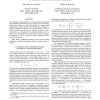Free Online Productivity Tools
i2Speak
i2Symbol
i2OCR
iTex2Img
iWeb2Print
iWeb2Shot
i2Type
iPdf2Split
iPdf2Merge
i2Bopomofo
i2Arabic
i2Style
i2Image
i2PDF
iLatex2Rtf
Sci2ools
113
click to vote
ICASSP
2008
IEEE
2008
IEEE
Belief propagation distributed estimation in sensor networks: An optimized energy accuracy tradeoff
The estimation error performance of Gaussian belief propagation based distributed estimation in a large sensor network employing random sleep strategies is explicitly evaluated for a simple model using density evolution analysis. Both regular sleep strategies, in which the number of nodes awake at any time instant is fixed, as well as irregular sleep strategies, in which the number of awake nodes may vary, are analyzed. The calculated estimation error is used to study the tradeoff between estimation accuracy and energy consumption, as well as to dictate the optimal parameters for the random sleep strategy.
Related Content
| Added | 30 May 2010 |
| Updated | 30 May 2010 |
| Type | Conference |
| Year | 2008 |
| Where | ICASSP |
| Authors | John MacLaren Walsh, Phillip A. Regalia |
Comments (0)

